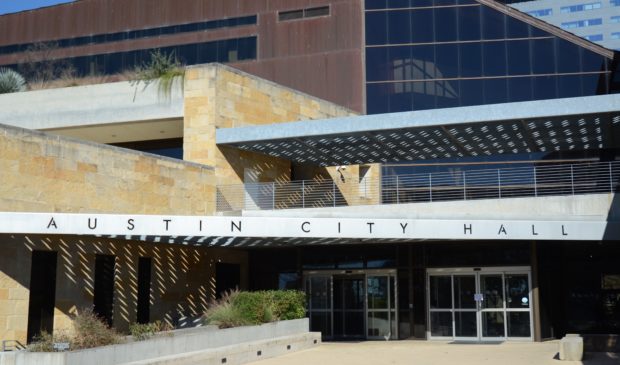Manager proposes tax hike, 2 percent employee raise
Monday, July 13, 2020 by
Jo Clifton Presenting a budget with a 2 percent employee pay raise and no layoffs and a 3.5 percent property tax increase, City Manager Spencer Cronk told Council Monday that his budget proposal meets the twin crises of the pandemic that has “upended our way of life and triggered an unprecedentedly swift economic contraction.” At the same time, he said, “the city is taking new steps to confront and end the long history of systemic injustices experienced by people of color by our public safety institutions.”
The 2020-2021 budget “meets these crises head-on, building on work to combat Covid-19 and help our community recover from its effects, while accelerating the process of reimagining our public safety system to ensure justice and equal treatment for all our residents,” Cronk said.
One way to thread that needle in a time of falling sales tax revenues is through $11.3 million in cuts to the Austin Police Department. That cut is a fraction of the $100 million reduction called for by the Austin Justice Coalition and its supporters.
The city’s financial management staffers have kept almost $26 million in excess in the reserve fund, according to Deputy Chief Financial Officer Ed van Eenoo, which is another key way to balance lost sales tax money. In addition, city budget planners made conservative estimates of future sales tax revenues. As a result, even though the city saw a sharp decline in sales taxes, “when we entered the crisis we were more than $10 million ahead of our estimates,” van Eenoo said during a media briefing.
The city’s financial planners intend to maintain 12 percent of the city’s funds in reserve despite the fact that they are drawing down 25 percent of those funds, he said.
For those watching other Texas cities struggle with the pandemic and lower tax revenues, Austin may stand out as an anomaly. Dallas and El Paso, for example, have furloughed hundreds of their employees. However, because of good financial planning, along with ownership of the cash-generating Austin Energy, Austin is able to increase monthly tax bills for the typical homeowner by just $1.64. Austin Energy has changed its rate structure to accommodate the many people working from home, resulting in a $3.45 monthly bill reduction. Austin Resource Recovery is increasing its monthly curbside collection fee by about $2 and Austin Transportation Department is raising its user fee by $0.25. Overall, a typical ratepayer can expect to pay about $1.04 a month more in the upcoming fiscal year for curbside collection, electricity, water and transportation services.
The proposed property tax rate is .4431 cents per $100 valuation, compared to .4377 for the current year. By increasing property taxes by 3.5 percent, financial planners are making it easier for Council to ask the voters for a tax increase to support Project Connect in November.
In terms of reimagining public safety, staffers propose to eliminate 100 vacant police officer positions for a total reduction of $9.2 million. Delaying the July 2020 cadet class will save the city an estimated $1.5 million and delaying a scheduled replacement of weapons will save an additional $400,000. The Austin Center for Events staff, which had been placed in APD, will be transferred to the Development Services Department, which is expected to save $200,000.
Cronk is proposing to reallocate $3 million from APD to the Office of Police Oversight and the city Equity Office to rewrite APD’s general orders and conduct and implement audits. In addition, Cronk proposes $2.7 million to expand the Integral Care-EMCOT contract for clinical staff and telehealth services. Another $2.3 million will be allocated from the APD budget to replace the aging records management system. The budget of Austin Public Health will be increased by $1.1 million to beef up the capacity for mental health services, family violence programs and immigrant legal services.
In addition, staffers propose reallocating $900,000 within the APD budget to fund training related to trauma response, unconscious bias and racial and cultural sensitivity training and training on how to safely administer naloxone to those experiencing a drug overdose. All of this is in line with previous direction from Council to revamp public safety.
The manager is also proposing a $1 million transfer to the Housing Trust Fund, as part of a $7.7 million transfer to that fund overall. These funds are intended to support services for the homeless and help prevent displacement of low-income families.
Although the city is proposing to keep the planned $1.5 million spending on improvements to the Asian-American Resource Center, the Carver Museum and the Mexican-American Cultural Center, there will be a 33 percent reduction in funding for cultural arts, historic preservation and live music as a result of a drastic decline in Hotel Occupancy Tax revenues.
City Council is scheduled to adopt the budget on Aug. 12, with public budget hearings to be held on July 23 and July 30.
The Austin Monitor’s work is made possible by donations from the community. Though our reporting covers donors from time to time, we are careful to keep business and editorial efforts separate while maintaining transparency. A complete list of donors is available here, and our code of ethics is explained here.
You're a community leader
And we’re honored you look to us for serious, in-depth news. You know a strong community needs local and dedicated watchdog reporting. We’re here for you and that won’t change. Now will you take the powerful next step and support our nonprofit news organization?










